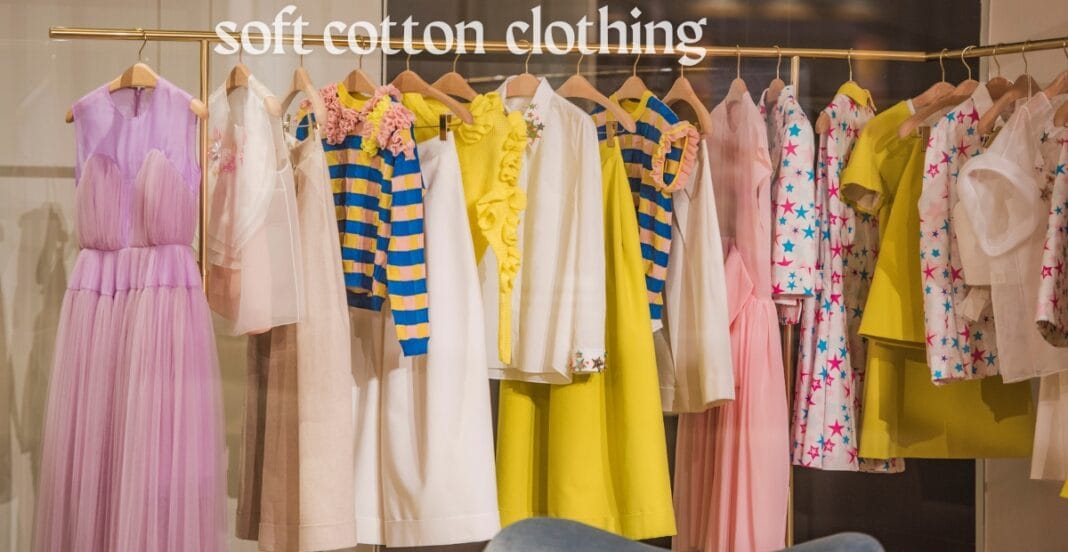The world has come to understand that comfort matters just as much as conscience, and ‘soft cotton clothing provides just that. Now, many brands have shifted to using soft cotton for their products as it provides a soothing touch while caring for the planet as well. This isn’t just a trend, it’s a transformation and now you are a part of it.
Table of contents
- Definition of Soft Cotton Clothing
- Cotton in Fashion History
- Reasons for Cotton’s Popularity
- Fashion Sustainability
- The Environmental Impact of Fast Fashion
- What Makes Soft Cotton Clothing Sustainable?
- Organic Cotton vs. Conventional Cotton
- Benefits of Wearing Soft Cotton Clothing
- Softest Cotton in Every Setting and Relaxed Everyday Wear
- Sustainable Soft Cotton Advocates
- Soft Cotton Clothing Waste Reduction
- Safe for Skin and Chemical-Free Comfort
- Cotton and Climate Change
- Farmers and Fair Trade Cotton
- Innovations in Cotton Processing
- Soft Cotton and Water Usage
- Certifications to Trust
- Consumer Behavior is Changing
- The Role of Social Media and Influencers
- Children Wearing Cotton
- Soft Cotton in Workwear and Uniforms
- Travel Light with Cotton
- How to Care for this Item
- The Truth about Cotton’s Eco Impact
- Misconceptions about the Sustainability of Cotton
- The Future of Cotton in Fashion
- How to Shop for Sustainable Cotton Clothing
- Creating a Cotton-Based Wardrobe
- Final Thoughts: Soft Cotton is the Future
- FAQs
Definition of Soft Cotton Clothing
Soft cotton clothing includes working and relaxing garments fashioned from natural and breathable cotton fibers. This fabric is smooth against the skin, as well as being absorbent, light, hypoallergenic, and non-noxious. From T-shirts to bedsheets and baby onesies, soft cotton seamlessly integrates portions of nature into your daily life.
Cotton in Fashion History
Cotton is not new. Ancient Indian, Egyptian, and Mexican civilizations utilized it to weave everyday wear. Over time, cotton began supplanting coarser fabrics, such as wool, used in warm-weather attire. The revolutions in the industry brought machines which made cotton clothing accessible to everyone.
Reasons for Cotton’s Popularity
Cotton is easily trusted. It breathes; not traping heat. It’s easy to wash and dries fast; winning the heart of everyone from farmers to fashionistas. Furthermore, cotton’s softness, durability and skin-friendliness are rare traits to find in modern fabrics.
Fashion Sustainability
Sustainable fashion attempts to design garments with less waste, pollution, and harm to workers. It’s opposed to cheaply made clothes designed for short use. It respects people, the planet, and begins with the right materials such as soft cotton.—
The Environmental Impact of Fast Fashion
Fast fashion creates an over abundance of inexpensive and shoddily crafted apparel. Consumers throw them away repeatedly. Factories spit pollution into rivers. Every worker in those factories gets paid peanuts. It’s a defective ecosystem. Softer cotton clothing is an alternative, albeit much kinder, remedy.
What Makes Soft Cotton Clothing Sustainable?
Soft cotton is not uniform. Softer cotton, particularly the organic types, is softer because it is cultivated without harmful pesticides. It requires less water and avoids artificial dyes. Most importantly, it biodegrades naturally after being tossed out.
Organic Cotton vs. Conventional Cotton
Regular or conventional cotton comes with a certain level of pesticides and harsh chemicals. These pollutants are bad for water and aquatic life. Organic cotton relies on crop rotation and natural pest management instead. It’s more sustainable for farmers and fields, and better for your skin.
Benefits of Wearing Soft Cotton Clothing
- Comfortable: Allows for maximum breathability.
- Safe: Does not contain strong dyes and harmful chemicals.
- Versatile: Fits all styles and ages.
- Low-Allergy: Suitable for people with delicate skin.
- Eco-Friendly: Supports environmentally friendly policies from planting threads to stitching the final product.—
Softest Cotton in Every Setting and Relaxed Everyday Wear
Soft cotton can be found on:
- t-shirts, tank tops, and summer dresses
- skirts
- sleepwear and undergarments
- baby clothes and accessories Cotton moves along with you and is never stiff or synthetic.
Sustainable Soft Cotton Advocates
Some brands practice sustainability more rigorously than others:
- PACT: produces Dover organically certified cotton.
- People Tree: certified by Fair Trade.
- Cotton On: focuses on ethics of sourcing.
- Everlane: builds their brand on disclosing information.
It is these brands that demonstrate that soft cotton can be stylish, gentle and inexpensive.
Soft Cotton Clothing Waste Reduction
Unlike polyester, cotton is biodegradable. Old shirts can be composted and old pants recycled. Cotton-based fabrics don’t cling to your conscience the same way plastic-based fabrics do.
Safe for Skin and Chemical-Free Comfort
Cotton differs because, unlike nasty irritants and toxic dyes for synthetic clothes, fabrics softness is natural. Cotton’s softness does not scratch. Instead, it soothes.
Cotton and Climate Change
In responsible production for cotton, it can significantly aid in decreasing one’s carbon footprint and CO₂ output while dealing with micro-plastics issue in the ocean.
Farmers and Fair Trade Cotton
Purchasing certified fair trade cotton supports farmers. It guarantees Fair Trade wages and ensures safe working conditions. It empowers farming families, many of whom reside in developing nations.
Innovations in Cotton Processing
Modern technologies are improving cotton sustainability. Now, water recycling, zero-waste dyeing, and even solar-powered spinning mills are used in cotton production.
Soft Cotton and Water Usage
Traditional cotton consumes a lot of water. New methods aim to change that. So do drip irrigation and drought resistant seeds.
Certifications to Trust
Look out for the following:
- GOTS – Global Organic Textile Standard
- OEKO-TEX – Certifies no harmful substances present
- Fair Trade – Ethical sourcing
These logos guarantee your cotton is clean.
Consumer Behavior is Changing
People increasingly check tags before making purchases. People are becoming more mindful of the materials used. More people are opting for soft cotton clothing instead of synthetics.
The Role of Social Media and Influencers
Fashion influencers now promote slow fashion. They showcase how cotton outfits are stylish, eco-friendly, and ethically made. Hashtags such as #SustainableStyle and #CottonComfort are gaining traction.
Children Wearing Cotton
Kids’ clothing made out of cotton is preferred by many parents. It’s gentle and tough. From bibs to school uniforms, cotton shields their delicate skin.
Soft Cotton in Workwear and Uniforms
A number of companies have started using soft cotton for their uniforms. It keeps staff cool and looks professional in addition to providing sustainable marketing. Workers are more productive when they are comfortable.
Travel Light with Cotton
Another perk of cotton is that it does not wrinkle easily. It can be rolled easily. It dries quickly and stays fresh. Thus, it is ideal for traveling, particularly in warmer areas.
How to Care for this Item
- To save energy, washing with cold water is recommended.
- To avoid shrinkage, air drying is the best option.
- Mild detergent should be used.
- Avoid strong bleach, softeners, or harsh fabric softeners.
These simple tips will help extend the lifespan of your cotton clothing.
The Truth about Cotton’s Eco Impact
Some people think it is not eco-friendly to use cotton. The issue lies with its cultivation and processing. Not all cotton is created equal.
Misconceptions about the Sustainability of Cotton
Indeed, cotton has its challenges. These include climate change or inflation. But consumer innovation can help resolve the problem alongside fair trade policies.
The Future of Cotton in Fashion
There is a marked shift of designers toward the use of natural fabrics. With new technological advancements and rising consumer awareness, soft cotton clothing is primed to take over sustainable fashion.
How to Shop for Sustainable Cotton Clothing
- Look for certification on the label
- Purchase from brands that practice ethical fashion
- Buy less but of higher quality
- Avoid fabrics blended with other fibers
- Reuse, recycle, or pass it on after using it
These strategies advocate for careful shopping which greatly contributes toward sustainable fashion.
Creating a Cotton-Based Wardrobe
A cotton-centric wardrobe could be developed by first: compiling timeless core pieces. An investment in quality instead of quantity is always a good choice. And when it comes to cotton, the philosophy epitomized is indeed ‘less is more.’
Final Thoughts: Soft Cotton is the Future
Wearable soft cotton clothing receives widespread acclaim for its aesthetic value, yet its benefits stretch far deeper. Each piece, whether a soft t-shirt or dress, carries a message. And that statement exemplifies one’s compassion towards not only oneself, but also the world. Read more How American cotton manufacturers
FAQs
Yes. It is non-allergenic and free from harmful chemicals.
Yes indeed. It reduces water waste, protects wildlife, and aids farmers.
Yes. Pure cotton can naturally decompose.


